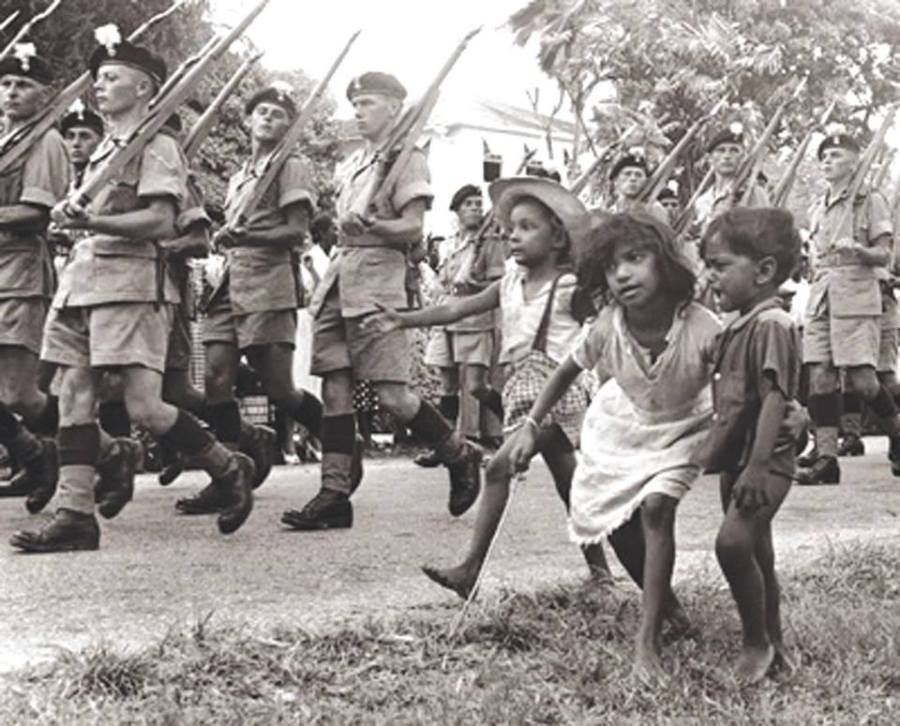
May 26th, 2016, Guyana’s 50th independence anniversary, presented a perfect opportunity for the APNU-AFC coalition government to revel in Guyanese nationalism. The 50th independence anniversary also closely coincided with the APNU-AFC’s 1-year anniversary in governance. To take advantage of this confluence of occasions, the government held a grand flag raising ceremony and government was able to rally the country to celebrate a half-century of self-governance and independence from the former colonial masters in Britain. To this day many Guyanese have their homes decorated in the commemorative memorabilia from the 2016 independence celebrations.
On the occasion of the country’s 51st anniversary, partially due to it being less of a momentous milestone and partially due to the many scandals the government has found itself in since last year, the celebrations have been more muted. It is in this somewhat more sober atmosphere we must try to understand what independence means for a country like Guyana. To do so we must return to the tumultuous period of Guyanese history which led up to our independence on May 26, 1966.
The Socialist Worker’s Alliance recently republished Martin’s Carter’s article “No Separate Salvation” that was published on the eve of the racial split in the People’s Progressive Party in 1955. To understand independence we must then ask what happened in the period between 1955 and 1966 that led to Forbes Burnham and the People’s National Congress (PNC) instead of Cheddi Jagan and the People’s Progressive Party (PPP) taking the country to independence?
It would appear very few Guyanese want to discuss this period, however, it suffices to say that under British military occupation, with collusion from the American Central Intelligence Agency, Burnham and the PNC allied with the United Force to beat the PPP at the polls under a new system of proportional representation. This form of “independence” helped to reinforce the partisan and racial divide in Guyanese politics, which remains with us to this day.
Interestingly, President David Granger, in his remarks on the 51st independence anniversary paints Guyana’s independence in much rosier language,
The ‘free state’ that we established on 26th May 1966 recognised our commitment to social cohesion through which we learn to accept and respect each other’s values and beliefs and to share the common space we call our homeland. The ‘free state’ is one that is free from discrimination; it is one that is built on the basis of respect for cultural diversity, political inclusivity and social equality.
Maybe the president understands the extent to which a neo-colonial nation exists under the dominance of imperialist nations like America, Britain and Canada and this is why ‘free state’ is put into quotation marks. What is more important here, however, is the concept of social cohesion. This has been an oft-repeated theme from president Granger and his administration and under their rule a Ministry of Social Cohesion has even been created.
Why do we need social cohesion though? It must mean that something is adrift in the ‘free state’ where “cultural diversity, political inclusivity and social equality” are supposed to be respected. Incredibly, president Granger often cites former PNC president Forbes Burnham as the “father of social cohesion.” If independence is to have real meaning, it is about time we tackle this assertion.
It is hard, of course, to speak in an objective manner about the racial and political divide in Guyana. Criticism of the PNC is taken to mean implicit support of the PPP and vice versa. So before talking about Burnham’s role in social cohesion and independence, and to assuage the minds of the readers who see implicit support for the PPP, it is important to note that the country’s racial divide in politics cannot be placed on any one party. It is well known that Cheddi Jagan did not do enough to combat the “Apan Jaat” ethnocentrism of Indo-Guyanese in the PPP. This of course led the basis for the more open ethno-centrism of the current leader of the PPP and former president Bharat Jagdeo who in his “Apan Jaat” as he alleges, without evidence, that Indo-Guyanese people and businesses are under attack since the rise of coalition government.
Returning to Burnham’s role in the independence movement, we must tackle the assertion that Burnham was the father of social cohesion. How can the man who engineered the split of the multi-racial PPP be thought of as the father of social cohesion? The answer, oddly, lies in a song by the Mighty Sparrow called B.G. War. Chronicling the rioting which erupted in the era preceding independence in 1966, Sparrow sings,
Well they drop a hydrogen bomb in B.G., Lord Have Mercy,
Riot in town mama, I hear the whole place on fire,
From Kitty to the waterfront, all that burn down flat flat
Sparrow pivots then pivots from describing the violence in leading up to independence to the military occupation by the British and Burnham’s role in ending the disturbances.
They send for soldiers quite up in England, with big confusion,
They bring down warship with cannon like peas, to shoot Guyanese,
But Burnham say alright now, I’m the only man to stop this row,
He give we the signal, and that was the case,
Now we have peace and quiet in the place.
As Guyanese people celebrate our 51st anniversary of independence from British rule we need to ask what power Burnham had that he could just give a signal and end the disturbances. Moreover, why did the US and British ruling class see Burnham as a better option than Jagan and the PPP? Moreover, how can the man who had the ability to end riots with just a signal, but allowed them to continue until ending them was politically advantageous for him be called the father of social cohesion? Keep in mind this Guyanese saying: “Teacher don’t beat for the question, but the answer.”





